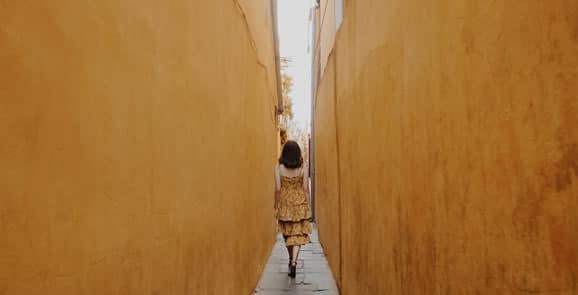Boaz asked the overseer of his harvesters, “Who does that young woman belong to?”
Ruth 2:5
“Do you think what we are doing is wrong? Isn’t this intrusive?” Marlee asked, genuinely concerned. I waved my hand in the air as if swatting the annoying words away.
“Listen,” I insisted, “we are doing research.”
Marlee—a single and vivacious twenty-two-year-old—met a guy at church who had commented on a few of her social media posts and even direct messaged her. Unsure of his intentions, she asked me what I thought. Without thinking twice, I pulled out my phone and googled his name. With the help of the World Wide Web, I found a host of information about him and tracked down his social media accounts. We huddled over my iPhone like FBI agents stalking a terrorist—we needed all the information we could find. Why? Because if there was going to be an advance into “foreign territory” (aka dating), she needed to be prepared.
Stalking Has Changed
Ten years ago, before the explosion of online dating and social media, stalking was a word reserved for weird men with scraggly hair and maybe a murky cockeye (à la your awkward next-door neighbor to whom you’ve never spoken a word). But with social media boasting four billion daily users, we have made internet “stalking” of potential boyfriends socially acceptable. Not only is it acceptable, it is a valuable tool when it comes to getting to know someone you’re attracted to from a safe distance.
To ensure we aren’t being driven by the lusts of the flesh, let’s take a clue from our friend Boaz. In Ruth 2, we see Boaz enter the story. He visits his enterprise and scopes out the land. The employees are hard at work when the owner of the field surveys his holdings. As he is going over the daily routine, he catches sight of someone new working the fields.
What does he do? Instead of swooping in and making some smooth moves on the young Moabitess, Boaz observes her from afar.
Learning from Boaz
We can learn a few things from the type of man Boaz was. For starters, he was intimately aware of who was in his field. A foreigner in his field caught his eye, and he did some research to find out who she was. Because Boaz didn’t have the handy help of Facebook or Instagram, he relied on the tried-and-true form of acquiring the background of a new person: he asked a trusted colleague, his overseer.
“Who does that young woman belong to?”
In a culture where family was your identity, your land and lineage said everything anyone needed to know about you. Unfortunately, Ruth had two strikes against her. Not only was she an immigrant, she was an immigrant from a despised land, Moab. As people who were birthed out of incest and worshipers of a false god, Ruth’s family would have been ostracized and despised among the chosen children of Israel.
If the conversation had stopped there, Ruth’s story might have ended as quickly as it began. But the overseer revealed to Boaz that Ruth was a hard worker who didn’t take lots of breaks. In that small byline, that brief inclusion, Ruth’s character spoke louder than her social status, marital status, or immigration status. Thank goodness there is always more to our stories; our history and heritage do not determine our outcomes.
Learning from a Distance
This is why I believe there is something wildly important about getting to know someone from a distance. When we become intimate with a person (through conversation, close proximity, and emotional connection), our judgment and decision-making can become clouded. The problem with dating or “going out” without investigating is that we make poor decisions, we lower our standards, and we think what’s in front of us is all there will ever be.
Boaz waited and researched from afar. Thanks to social media and the internet, so can we. If you are interested in someone, do your research! It’s easy to become infatuated with someone up close, so do your investigating from a distance.
Here are some tips on how to investigate someone online in the appropriate manner:
- Google. Google is a search engine that can help you find the best place to eat in your area, trending news, and—lo and behold—it’s also great for cyberstalking a potential date.
Just so we are clear, I’m a cyberstalker and proud of it. Not only have I stalked online every man I’ve ever dated, to this day I creep every conference and church I speak at. I visit their website, check out their social media, and even click on their hashtags. Why? Because the internet is the best way to find out not only what people say about themselves, but what other people say about them.
If I googled a guy and discovered he was voted Beer Kegger Champion of his college, was tagged in tons of photos half-dressed at parties, and every photo in Google Images was taken with a different girl, I’d probably think twice about going out with him.
And before anyone judges me and says, “ Don’t be so judgmental,” let me say this: you’re right. But if there’s nothing online to balance out the half-dressed party animal pictures, then that’s a red flag.
On the other hand, if someone has no online presence at all, that’s also a red flag. Like, have you been living in a hermit commune with no internet? Use this tool to learn more about the people you’re thinking about doing life with.
- Social Media. I love social media. I consistently say social media is the greatest social equalizer. Prior to social media, we would never have had access to the president of the United States . But now, all I have to do is tag @POTUS, and I have directly communicated to the leader of the free world.
What we put out on social media is a reflection of who we are, what we believe, and who we engage with. (Note: I did not say social media is who we are. Social media is a curated reflection of who we are and how we want to be perceived.)
You can learn so much about someone by researching his social media accounts. Does he share your values? Does he like the same things you do? Can he spell? All this can be learned simply by scrolling through someone’s social media profile.
Don’t believe everything on the internet . . . maybe just half of it. Because it’s likely at least half of it is true.
- Ask friends. What Boaz did by asking his overseer about Ruth was even better than googling her, because the best way to get to know someone is to ask their friends. Nothing will ever trump direct relationship.
No article can adequately communicate someone’s heart.
No photo can show a full picture of someone’s life.
No post can express the totality of someone’s worldview.
But conversations with people who directly know a person give life and breath to that person, even if they’re far away.
Take your time. Do your research. Ask questions. You might just discover someone in your field who comes from a bad family and isn’t from your area but works hard and has a good reputation.
You’re welcome.
Taken from How to Have Your Life Not Suck by Bianca Olthoff. Copyright © 2019 by Bianca Olthoff. Used by permission of Zondervan. www.zondervan.com.












